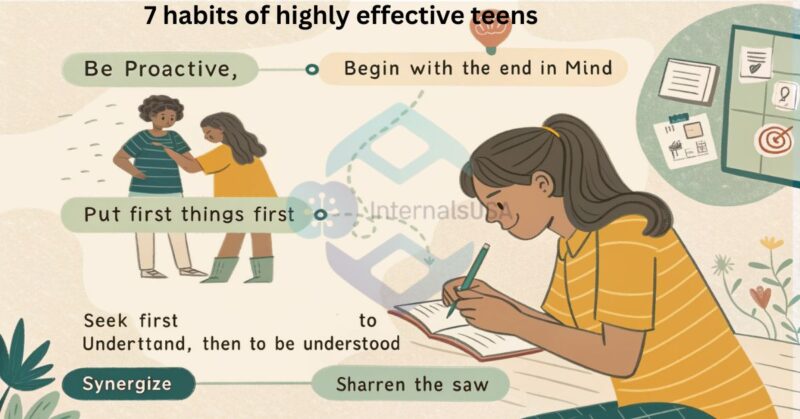7 Habits of Highly Effective Teens: A Complete Guide for Teen Growth and Success
Learn how to unlock your full potential with the 7 habits of highly effective teens. This in-depth guide reveals practical strategies for personal growth, teen productivity, time management, and success in school and life. Discover how these powerful habits adapted from Sean Covey’s bestselling book can help teens take control of their choices, build confidence, improve communication, set meaningful goals, and achieve balance in all areas of life.
Whether you’re a teenager looking to grow, a parent aiming to guide, or a teacher wanting to empower your students, this article offers real-life examples, simple explanations, and easy tips for lasting impact. Embrace the journey toward becoming a highly effective teen today. Teenage years are one of the most important phases in a person’s life. It’s a time of dreams, discovery, decisions, and direction. However, it can also be confusing and overwhelming. That’s why learning the 7 habits of highly effective teens can make a life-changing difference.
These habits offer a roadmap for teens to become confident, focused, and successful not just academically, but socially and emotionally too. Inspired by Sean Covey’s influential book, these habits are not just rules; they are guiding principles. When practiced regularly, they help teens take control of their lives, make smarter choices, and build better relationships. Let’s explore each habit deeply and see how teens can apply them in daily life.
Be Proactive: Take Charge of Your Life
This habit is about taking responsibility. Instead of blaming others or situations, proactive teens understand they are in control of their own actions, thoughts, and feelings. This means choosing how to respond to challenges, making good decisions, and not letting emotions take over.
How to Be Proactive
- Respond with calm, not anger.
- Focus on what you can do, not what you can’t.
- Use phrases like “I choose to…” or “I will…”
Real-Life Example
Sarah failed a math test. Instead of blaming her teacher, she took the initiative to study harder and ask for help.
Begin with the End in Mind: Plan Your Future

This habit is about setting clear goals and working towards them. Teens with a strong vision for their future are more likely to stay motivated and focused. Whether it’s a dream career, academic achievement, or personal growth, knowing your destination helps you make better choices today.
How to Begin with the End in Mind
- Think about where you want to be in 5 or 10 years.
- Write a personal mission statement.
- Set short-term and long-term goals.
Real-Life Example
Ahmed dreams of becoming a doctor. He sets a weekly schedule that includes study hours and volunteering at a clinic.
Put First Things First: Manage Your Time Wisely
Time management is a major challenge for teens. This habit helps prioritize important tasks over urgent or fun distractions. Learning to manage time wisely allows teens to achieve their goals while also having time to relax and enjoy life.
How to Put First Things First
- Identify top priorities (e.g., study, exercise, rest).
- Use a planner or digital calendar.
- Say “no” to distractions when needed.
Real-Life Example
Lily avoids social media during her homework time. She studies first, then rewards herself with screen time.
Think Win-Win: Everyone Can Succeed

Many teens fall into the trap of competition and comparison. This habit teaches cooperation instead of competition. A win-win attitude means believing there’s enough success to go around and working toward mutual benefits.
How to Think Win-Win
- Celebrate others’ success without feeling threatened.
- Look for solutions where everyone gains.
- Build relationships on trust and respect.
Real-Life Example
During a group project, Daniel divides tasks fairly and encourages everyone to contribute equally, leading to better results.
Seek First to Understand, Then to Be Understood: Practice Empathy
This habit is about truly listening before speaking. Many teens struggle with communication because they don’t feel heard. When teens learn to listen with empathy, they create stronger relationships and avoid misunderstandings.
How to Practice Empathy
- Listen with your eyes, ears, and heart.
- Don’t interrupt or offer advice too quickly.
- Ask clarifying questions to show you care.
Real-Life Example
When his friend was upset, Mike listened instead of judging. His friend felt better, and their bond grew stronger.
Synergize: Value Differences and Teamwork

Synergy means working together to achieve more than you could alone. This habit encourages teens to value diversity in opinions, backgrounds, and strengths. When teens learn to collaborate effectively, they unlock new ideas and better outcomes.
How to Synergize
- Respect different opinions.
- Focus on team strengths, not individual weaknesses.
- Be open to compromise and creativity.
Real-Life Example
In a school club, Amy and her teammates brainstormed together. Their combined ideas led to a successful fundraiser.
Sharpen the Saw: Take Care of Yourself
The last habit is about renewal physically, mentally, emotionally, and spiritually. Teens need to take care of themselves regularly to perform at their best. This habit helps avoid burnout and builds long-term resilience.
How to Sharpen the Saw
- Get enough sleep, eat healthily, and stay active.
- Take breaks from screens and stress.
- Read, meditate, pray, or journal to relax your mind.
Real-Life Example
Jake starts his day with a 15-minute jog and reads for 10 minutes before bed. It helps him stay focused and calm.
The Power of Combining All 7 Habits
While each habit is powerful on its own, the real magic happens when teens practice all seven together. These habits build on one another. Being proactive leads to better goal-setting. Prioritizing helps achieve goals. Listening improves teamwork. Self-care fuels every other habit.
Key Benefits of Practicing the 7 Habits
- Improved focus in school and extracurriculars
- Better decision-making in tough situations
- Stronger relationships with friends and family
- Higher self-confidence and motivation
- Balanced life with less stress
Applying the 7 Habits in Daily Teen Life
Here’s how teens can integrate these habits daily:
| Habit | Daily Practice Idea |
|---|---|
| Be Proactive | Make your bed and plan your day before school |
| Begin with the End in Mind | Write down one goal for the week |
| Put First Things First | Finish homework before gaming |
| Think Win-Win | Share credit on group projects |
| Seek First to Understand | Ask a friend how their day was really listen |
| Synergize | Join a team or club at school |
| Sharpen the Saw | Do yoga, walk, or take a break without screens |
Parents and Teachers: How to Support These Habits
Adults play a big role in helping teens develop effective habits. Here’s how:
- Model the habits in your own behavior.
- Praise effort, not just results.
- Create routines that support good habits.
- Encourage reflection through open conversation.
- Provide resources like journals, planners, or books.
Mastering the 7 Habits of Highly Effective Teens: A Blueprint for Lifelong Success
The 7 habits of highly effective teens serve as a powerful blueprint for teenagers striving to build a successful and balanced life. Developed by Sean Covey, these habits are tailored to the unique challenges and pressures teens face today. From social distractions and academic stress to peer pressure and future uncertainty, teens are often overwhelmed. These habits starting with being proactive and ending with self-renewal help teens take control of their thoughts, actions, and goals.
By mastering these habits, teens learn to think ahead, manage their time, strengthen relationships, and care for their mental and physical well-being. Habit 1 teaches responsibility, Habit 2 sets direction, and Habit 3 builds discipline. Meanwhile, Habits 4 to 6 enhance social and emotional intelligence, while Habit 7 ensures personal renewal. Together, they create a solid foundation for growth. When teens embrace these life-changing principles, they not only perform better in school and relationships but also develop the mindset needed for long-term success. The earlier they start, the stronger their future will be.
FAQs About 7 Habits of Highly Effective Teens
What age group is best suited to learn the 7 habits of highly effective teens?
These habits are ideal for teenagers aged 12–18, though they can benefit anyone seeking personal growth.
How long does it take to develop these habits?
It varies. Some habits can be learned in weeks; others take months. Consistent practice is key.
Can these habits help with academic performance?
Yes. Teens who use these habits often improve time management, focus, and goal-setting all of which lead to better grades.
Are the 7 habits useful outside of school?
Absolutely. They help in friendships, family life, extracurriculars, and even part-time jobs.
Is the book “7 Habits of Highly Effective Teens” worth reading?
Yes. It offers relatable stories, helpful exercises, and deeper insight into each habit.
Conclusion
Success isn’t about being perfect it’s about progress. The 7 habits of highly effective teens are simple, yet powerful tools that can guide any teen toward a better life. These habits don’t require talent or money; they just need commitment and consistency. By starting with small actions, teens can develop a growth mindset, handle responsibilities, and build a meaningful future.
Whether you’re aiming for better grades, stronger friendships, or personal peace, these habits offer the direction you need. So, take the first step today. Start being proactive. Set a goal. Organize your day. Listen more. Work with others. Take care of yourself. Your future begins with your habits. Make them count.
Also Read
Lifestyle Newborn Photography: Capturing Authentic Beginnings
The Holistic Lifestyle: A Path to Complete Well-Being
The Ultimate Guide to Burda Fashion Style: A Timeless Trend in Modern Sewing








Leave feedback about this